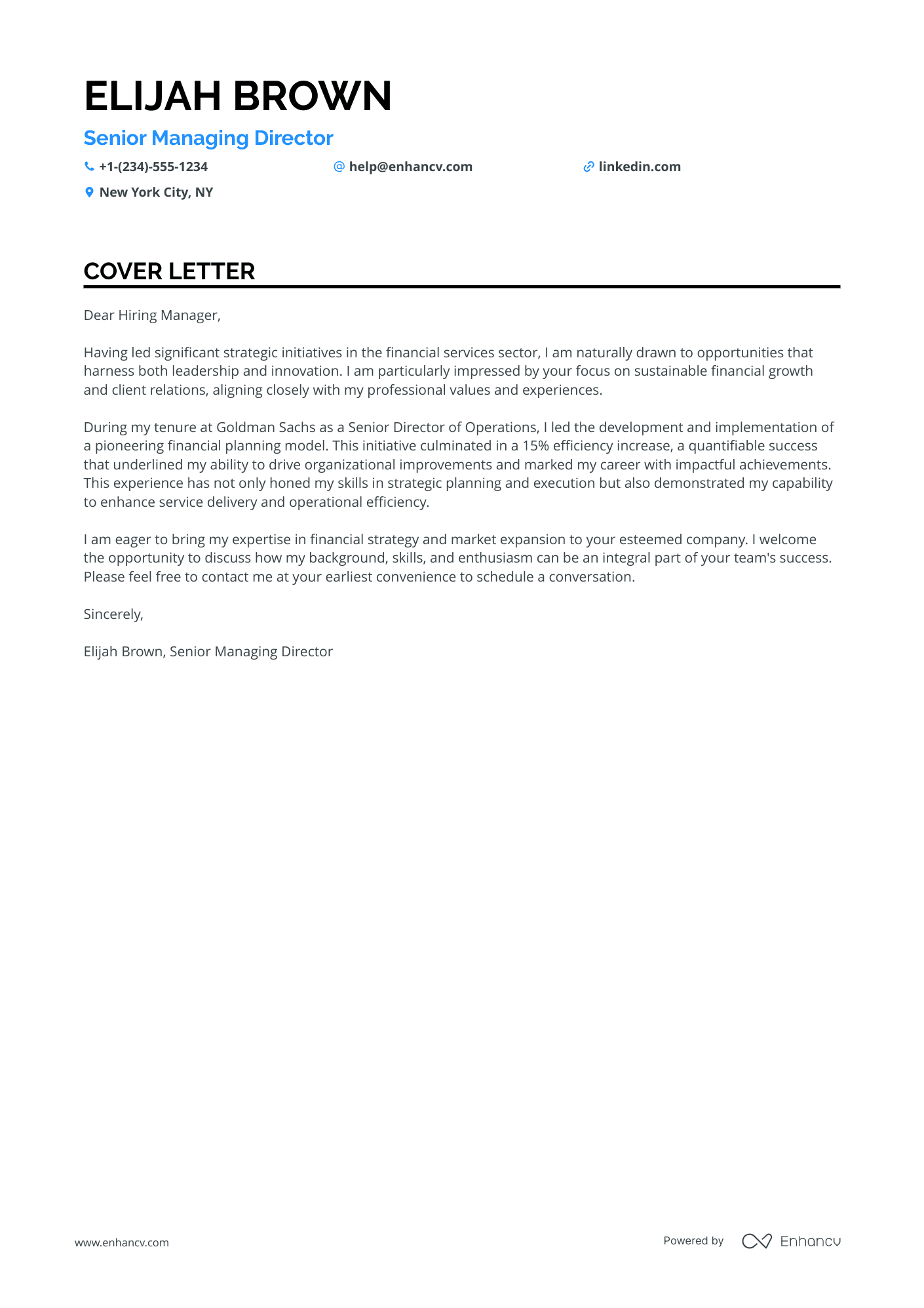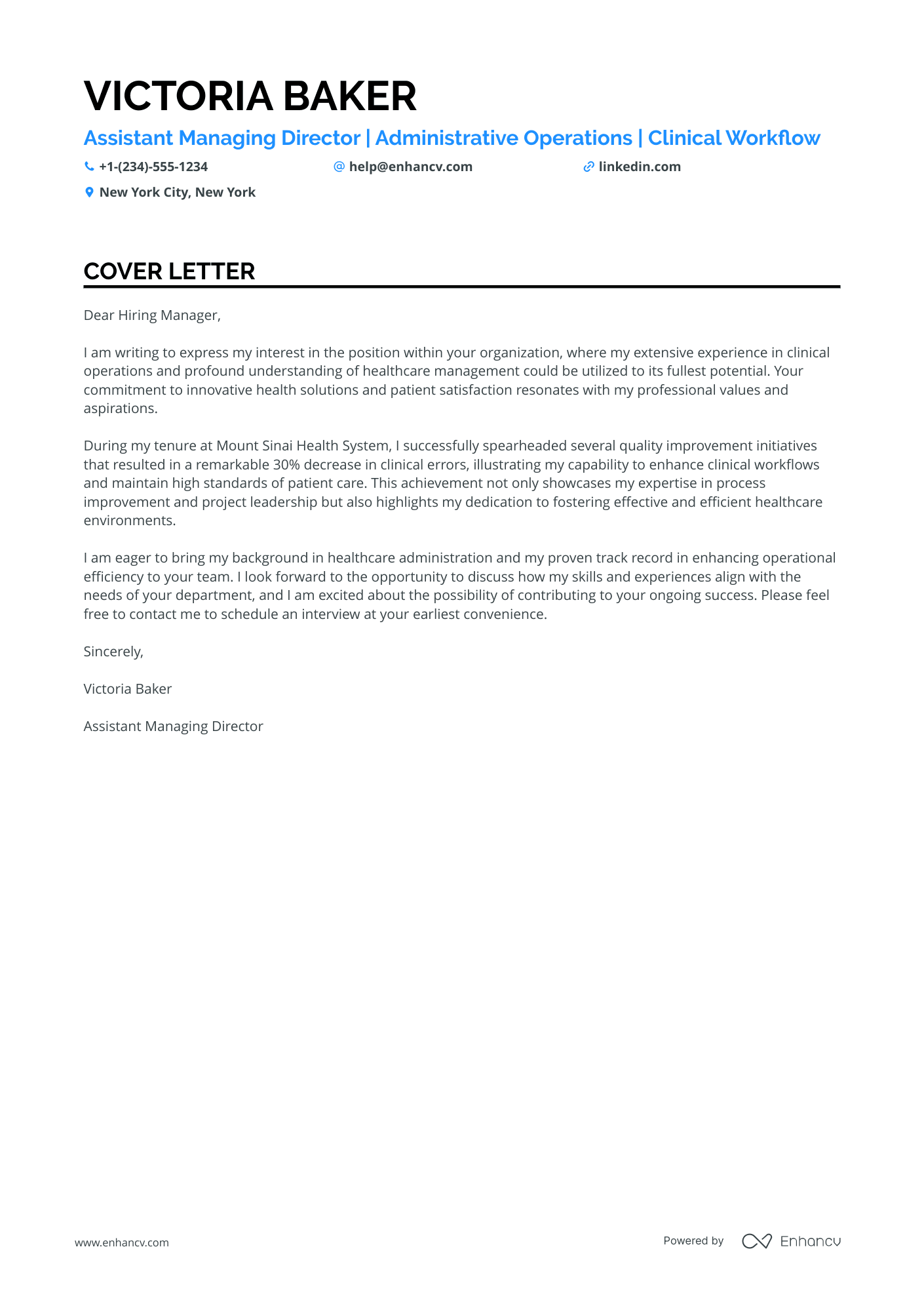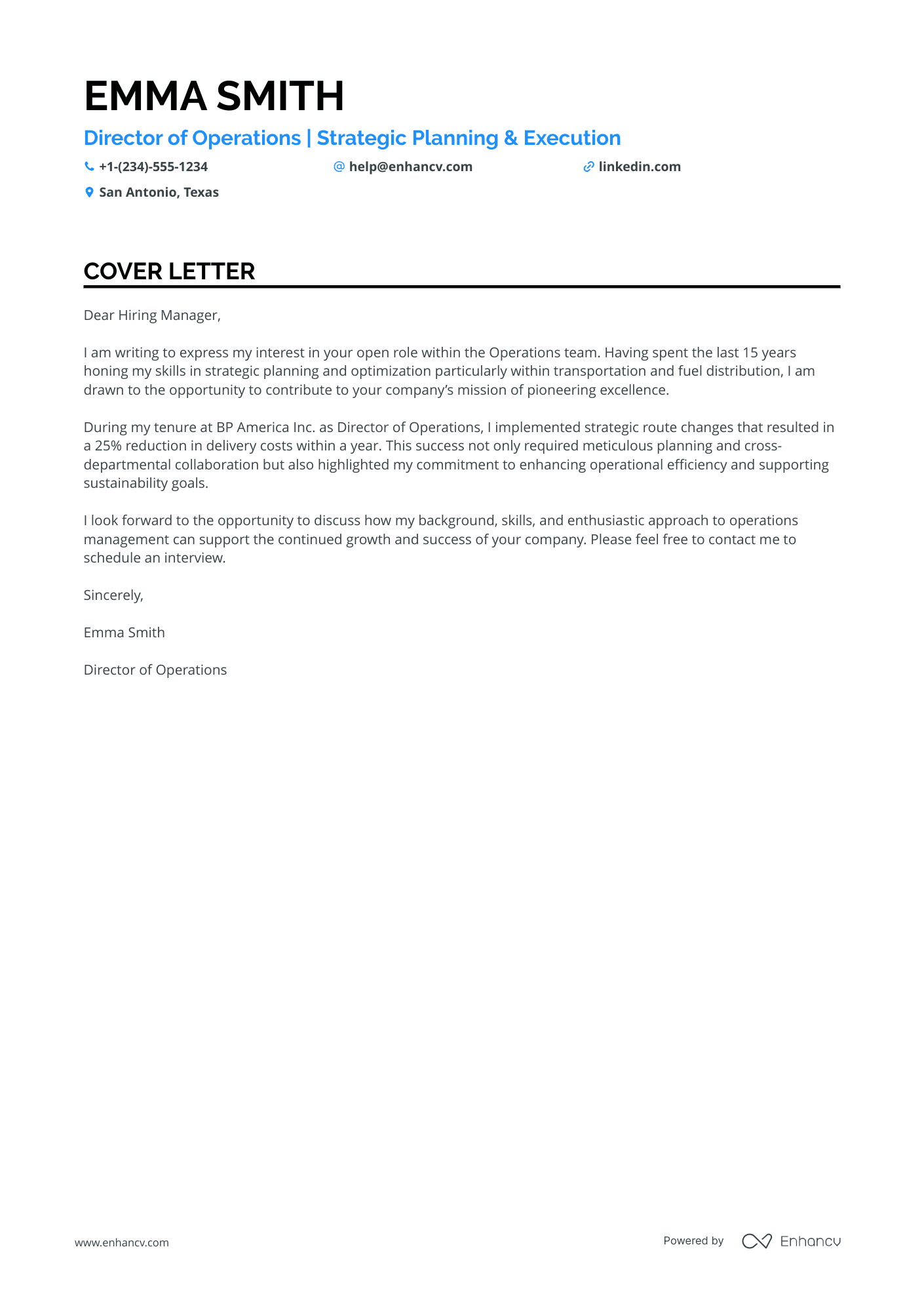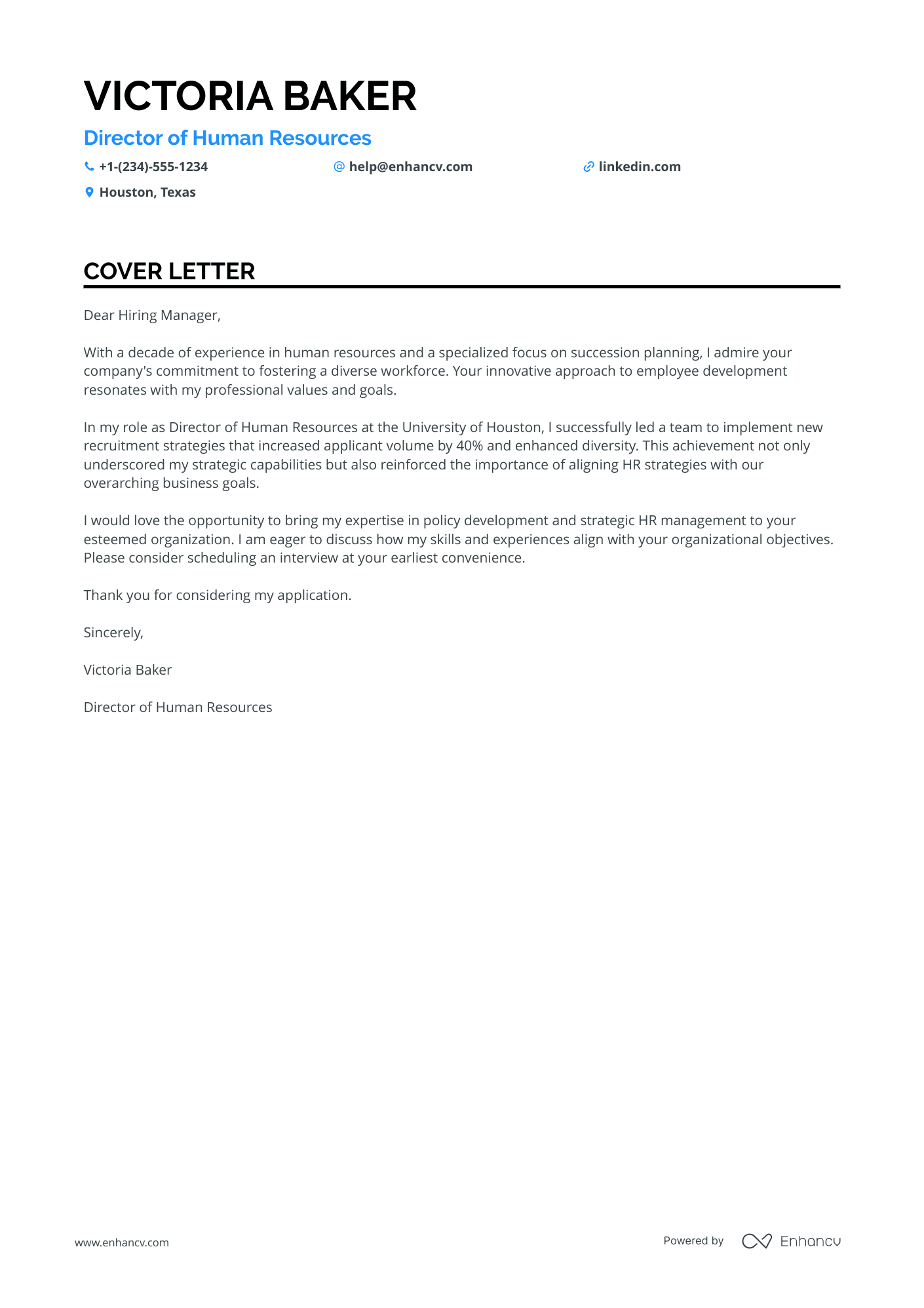Crafting a managing director cover letter can be daunting, especially when you're already deep into your job hunt. You understand it's more than a resume echo—it's where you weave the narrative of your proudest professional triumph. But how do you balance formality with genuine personality, steering clear of those overdone phrases? And how do you condense your impressive repertoire into one concise page? Fear not; you're about to learn the art of distilling your story, effectively and efficiently.
- Personalize the greeting to address the recruiter and your introduction that fits the role;
- Follow good examples for individual roles and industries from job-winning cover letters;
- Decide on your most noteworthy achievement to stand out;
- Format, download, and submit your managing director cover letter, following the best HR practices.
Use the power of Enhancv's AI: drag and drop your managing director resume, which will swiftly be converted into your job-winning cover letter.
If the managing director isn't exactly the one you're looking for we have a plethora of cover letter examples for jobs like this one:
Drop your resume here or choose a file.
PDF & DOCX only. Max 2MB file size.
Managing director cover letter example
JAMES JOHNSON
New York City, NY
+1-(234)-555-1234
help@enhancv.com
- Highlighting relevant experience by specifying the role at Deloitte and the successful initiative that aligns with the healthcare financial advisory sector.
- Quantifying achievements, such as the 20% revenue boost and 25% increase in operational efficiency, which gives tangible proof of past performance and skill effectiveness.
- Demonstrating thought leadership and a commitment to continuous improvement, which are valuable traits in a candidate for a managerial and advisory position.
Five tips on formatting your managing director cover letter
Do you want to make a good impression on recruiters and, at the same time, follow the best industry advice on writing your managing director cover letter?
Make sure to include the following:
- Header and Salutation;
- Introductory paragraph;
- Body paragraph;
- Closing paragraph;
- Signature (this one is up to you).
Remember to use the same modern, simple font for your managing director cover letter as you did for your resume (e.g. Lato, Rubik, etc.)
Ensure your managing director cover letter is single-spaced and is wrapped around a one-inch margin, like in our cover letter templates.
Once completed, use our cover letter builder to export your managing director cover letter in the best format to keep your information intact - PDF.
At the end of the day, your managing director cover letter won't be assessed by the Applicant Tracker System (ATS) software, but by the recruiters. Your information should thus be legible, organized, and follow a structured logic.
Maximize your efficiency! With our free cover letter generator, you’ll have a great letter in moments.
The top sections on a managing director cover letter
- Header: This section should include the managing director's name, address, phone number, email, and the date, ensuring that the recruiter can easily identify and contact the candidate for follow-up discussions.
- Opening Greeting: A formal salutation that addresses either the specific name of the recruiter or a general title such as "Dear Hiring Committee," establishes a professional tone for the communication and underscores the managing director's attention to detail.
- Executive Summary: In this section, the managing director should succinctly highlight their leadership experience, strategic vision, and track record of delivering results, which are crucial attributes for someone aiming to occupy a top management position.
- Leadership and Achievements: This is where the managing director showcases specific examples of past leadership roles, strategic initiatives they’ve led, and quantifiable achievements, demonstrating to the recruiter their capability to drive organizational success.
- Closing and Call to Action: The managing director should end the cover letter by reiterating their interest in the position, thanking the recruiter for considering their application, and expressing a desire for a personal interview, effectively prompting the recruiter to take the next step.
Key qualities recruiters search for in a candidate’s cover letter
- Strategic Vision: Demonstrates the ability to craft and implement long-term business strategies that align with company goals and adapt to changing market conditions.
- Leadership and People Management: Exhibits strong leadership capabilities, including the ability to inspire, motivate, and develop a high-performing executive team and workforce.
- Financial Acumen: Possesses a deep understanding of financial reporting, budgeting, and fiscal management to ensure healthy business operations and growth.
- Industry Expertise: Shows a comprehensive knowledge of the industry that the company operates in, including trends, challenges, and competitor landscape.
- Stakeholder Relations: Has experience in effectively communicating and building relationships with key stakeholders, including investors, board members, customers, and partners.
- Operational Excellence: Proven track record of driving operational efficiency, process improvement, and excellence in delivering products or services.
What greeting should you use in your managing director cover letter salutation
A simple "Hello" or "Hey" just won't work.
With your managing director cover letter salutation, you set the tone of the whole communication.
You should thus address the hiring managers by using their first (or last name) in your greeting.
But how do you find out who's recruiting for the role?
The easiest way is to look up the role on LinkedIn or the corporate website.
Alternatively, you could also contact the organization via social media or email, for more information.
Unable to still obtain the recruiter's name?
Don't go down the "To whom it may concern path". Instead, start your cover letter with a "Dear HR team".
List of salutations you can use
- Dear Hiring Manager,
- Dear [Company Name] Team,
- Dear Mr./Ms. [Last Name],
- Dear Search Committee,
- Dear [Department] Team,
- Dear Hiring Committee,
Introducing your profile to catch recruiters' attention in no more than two sentences
The introduction of your managing director cover letter is a whole Catch 22 .
You have an allocated space of no more than just a paragraph (of up to two sentences). With your introduction, you have to stand out and show why you're the best candidate out there.
Set out on a journey with your managing director cover letter by focusing on why you're passionate about the job. Match your personal skills and interests to the role.
Another option for your managing director cover letter introduction is to show you're the ideal candidate. Write about how your achievements and skills are precisely what the company is looking for.
However you decide to start your managing director cover letter, always remember to write about the value you'd bring about. Making it both tangible (with your metrics of success) and highly sought out.
How to select your best achievement for the middle, or the managing director cover letter body
You probably feel exhausted by this point in your application: you've dived into all the details of your success and skills in your managing director resume.
What else can you include in your managing director cover letter body?
Well, for starters, the next three to six paragraphs should show you further value as a professional. Or, why should recruiters choose you?
Think back on a noteworthy achievement that answers key job requirements and dive deep.
Structure your managing director cover letter middle as you'd a story: following chronological logic and highlighting outcomes, thanks to skills.
At the end of the day, you'd want recruiters to be able to see you as the best candidate for the role and understand more about who you are and what makes your success unique (and valuable to the role).
Thinking about the closing paragraph of your managing director cover letter
Before your signature, you have extra space to close off your managing director cover letter.
Use it to either make a promise or look to the future.
Remind recruiters how invaluable of a candidate you are by showing what you plan to achieve in the role.
Also, note your availability for a potential next meeting (in person or over the telephone).
By showing recruiters that you're thinking about the future, you'd come off as both interested in the opportunity and responsible.
Which story should you tell in your managing director cover letter when you have zero experience
Candidates, lacking professional experience in the field - this one is for you.
Your managing director cover letter is an exercise of integrity, honesty, and, above all, spinning a positive narrative around your strengths.
And what better way to capture recruiters' attention than with your most job-relevant achievement (this could be from your internship or volunteering experience)?
Make sure to back up your success with transferrable skills that are relevant to the job (e.g. how your year, studying abroad, has taught you to be more motivated and handle multicultural environments).
Another safe card you can bet on is your career dream: in the body of your managing director cover letter, go into the details of how your ambitions would help make the company you're applying for better.
Key takeaways
Summarizing the most important aspects in writing your managing director cover letter, remember to:
- Create a personalized managing director cover letter for each role you apply for, that includes the recruiter's name in the salutation;
- Format your managing director cover letter with single-spacing, one-inch margins, and a modern, yet ATS-friendly font;
- Always start off your managing director cover letter with two sentences that reflect what is most important about your application;
- Your managing director cover letter body should feature your biggest accomplishments and the job-relevant skills it has taught you;
- Instead of opting for the "Sincerely yours" ending, close your managing director cover letter with a nod to the future with what you aim to achieve in this potential role.
Managing Director cover letter examples
By Experience
Senior Managing Director
- Tailored Alignment: The cover letter demonstrates an understanding of the company's values by aligning personal and professional goals with the company's focus on sustainable financial growth and client relations. This personalization shows a genuine interest in the position.
- Quantifiable Achievements: The applicant highlights specific achievements, such as leading the development of a financial planning model that resulted in a 15% efficiency increase, showcasing their ability to deliver measurable results and value to the organization.
- Leadership and Innovation: The letter emphasizes the applicant's role in strategic initiatives, illustrating their ability to lead and innovate, which is essential for high-level positions in financial services.
- Open to Dialogue: The closing paragraph encourages further discussion, inviting the hiring manager to engage with the applicant, which demonstrates enthusiasm and readiness for potential collaboration.
Junior Managing Director
- Highlighting relevant experience: The mention of leading quality improvement initiatives and achieving a quantifiable reduction in clinical errors showcases the candidate's experience in clinical operations and commitment to enhancing patient care.
- Specific achievements: The specific achievement of reducing clinical errors by 30% provides tangible evidence of the candidate's problem-solving skills and ability to implement effective solutions.
- Alignment with organizational values: Expressing alignment with the company's commitment to innovative health solutions and patient satisfaction demonstrates the candidate's research and genuine interest in the organization.
- Expressing enthusiasm and offering availability: The candidate's eagerness to discuss how their skills align with the needs of the department and offering to schedule an interview shows proactive engagement and flexibility.
By Role
Managing Director of Operations
- Highlighting specific achievements: Mentioning a quantifiable success, such as achieving a 25% reduction in delivery costs, underscores one's impact and ability to drive results in the operations field.
- Emphasizing relevant experience: Noting 15 years of experience in strategic planning and optimization within transportation and fuel distribution directly aligns with the role’s expectations.
- Connecting experience to company goals: Demonstrating how past successes align with the prospective company's mission, such as supporting sustainability goals, can make the applicant a compelling fit.
- Showcasing collaboration skills: Mentioning cross-departmental collaboration highlights the candidate's ability to work effectively with others, a crucial skill in operations management.
Managing Director of Human Resources
- Emphasize relevant experience: The letter highlights a decade of experience in human resources, focusing on succession planning, which aligns well with roles seeking seasoned professionals.
- Showcase specific achievements: The mention of implementing recruitment strategies that increased diversity and applicant volume by 40% demonstrates tangible results and impact, showcasing effectiveness in past roles.
- Align with company values: The candidate connects their professional values and goals with the company's commitment to a diverse workforce, showing that they understand and are aligned with the organization's priorities.
- Express eagerness and adaptability: By conveying a desire to bring their expertise and discussing alignment with organizational objectives, the candidate shows enthusiasm and adaptability, important traits for HR roles.













